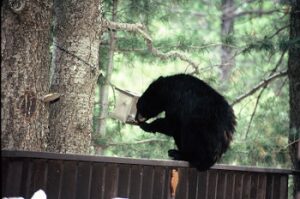PHOENIX — Arizona’s hot, dry conditions have reduced the amount of natural vegetation available to bears in the wild, raising the chance of them wandering into areas they are typically not seen in search of food.
According to Arizona Game & Fish (AZGFD), although bears are typically shy and tend to avoid humans, they have an excellent sense of smell, and this can be problematic for bears and people.
Wildlife officials advise those living in or visiting bear country to not feed wildlife or leave trash or other attractants, such as pet food or bird seed, accessible because a fed bear is a dead bear.
“If a bear becomes habituated to getting food from trash cans and other human sources, it’s only a matter of time before it loses its fear of humans and begins to actively search out other human food sources,” says Amy Burnett, AZGFD information and education program manager. “At that point, the bear becomes a threat to public safety.”
Here are a few safety tips from AZGFD to avoid attracting bears:
Residence
- Keep all trash inside a secured area until collection day. If that’s not possible, keep food waste in a bag in the freezer and place those in the trash as close to collection time as possible.
- Take bird feeders down at night.
- Keep pet and livestock food inside or remove all uneaten food.
Although forest closures or restrictions due to wildfires and hot, dry conditions may temporarily affect access for hiking and camping in parts of Arizona, the following are good tips nonetheless:
Camping
- Keep your food and attractants secured and inaccessible to bears. Do not keep food in your tent.
- Don’t burn left-over food or trash on the grill or in a campfire.
- Set up your campsite away from places where bears might forage for food, such as creeks, rivers and other bodies of water.
Hiking
- Don’t wear scented lotions, deodorant or perfumes.
- Make noise or hike in groups.
- If you take your pet hiking with you, keep it on a leash at all times.
- In case of a bear encounter
- Do NOT run.
- Back away slowly while keeping your eyes on the bear.
- Make yourself look bigger than you are by raising your arms or pulling your shirt/jacket up higher than your head.
- Throw items and yell at the bear.
- If attacked, fight back.
Bear sightings in areas where there is human activity should be reported to AZGFD’s dispatch center at 623-236-7201. For questions or to obtain a brochure on living with bears, visit www.azgfd.com/Wildlife/LivingWith.







